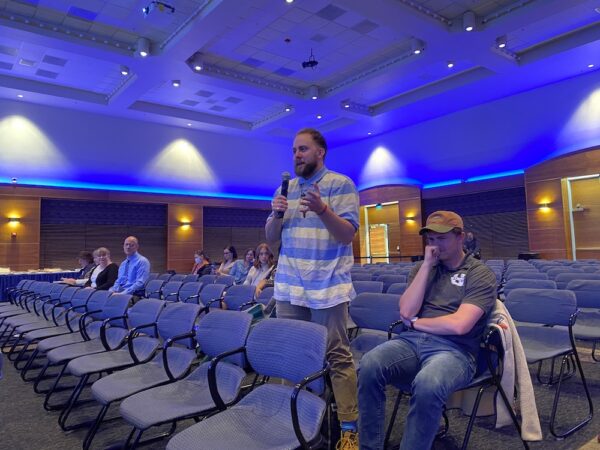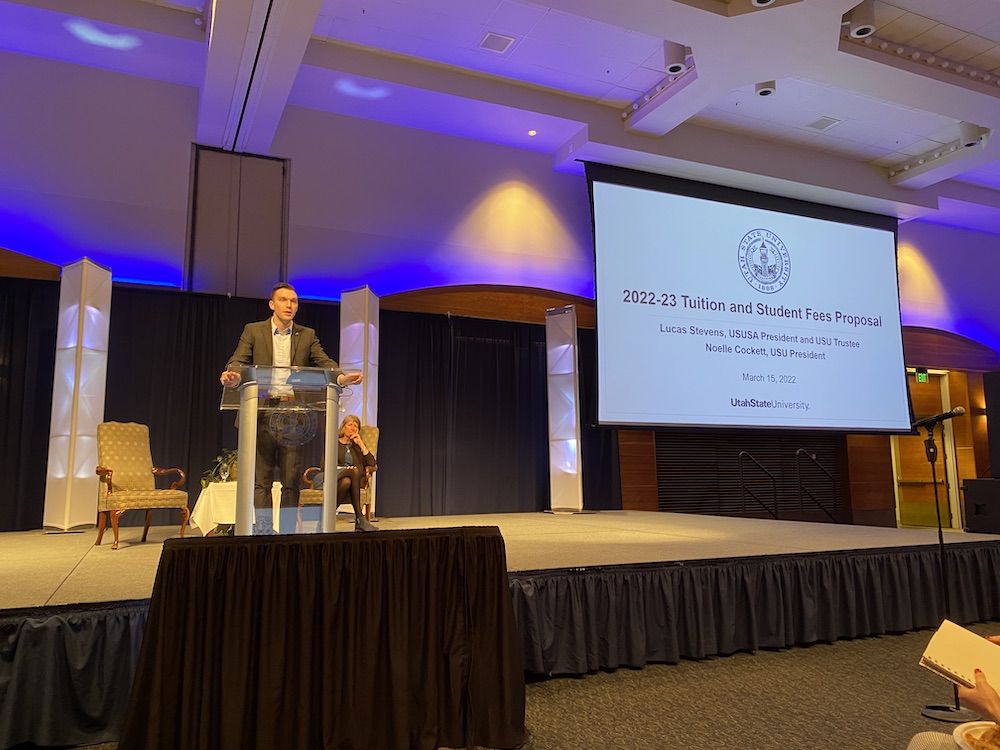USU students should expect a rise in tuition for upcoming school year
The annual Truth in Tuition event, hosted by Utah State University Student Association President Lucas Stevens and Utah State University President Noelle Cockett, was held in the Evan N. Stevenson Ballroom in the TSC on March 15 and proposed a 3.5% increase in tuition for the 2022-2023 school year that will apply to all statewide campuses.
Student fees, however, are not expected to increase and will remain at $439 a semester.
This event is open each year for all students to attend and serves the purpose of maintaining transparency with student finances and proposing any necessary changes to cost.
This year it was broadcasted live for anyone who couldn’t be there in person and for students attending other Statewide Campuses.
Before beginning, Cockett greeted all staff and students in attendance to introduce herself and to thank them for coming.
It started with Stevens welcoming everyone to the event and introducing student fees, following Cockett’s proposal of the tuition increase.
She explained that any tuition changes must be reviewed by multiple groups, including a student tuition review committee, USUSA Executive Council, USU Board of Trustees and eventually the Utah Board of Higher Education.
The final proposal to the Utah Board will be on March 24, which students are also welcome to attend in-person or virtually.
Cockett claimed the reason for the higher cost is to pay for part of the 5.75% salary compensation increase that the Utah Legislature approved for all state employees.
“This is actually the highest increase that the state has given state employees for over 20 years,” Cockett said. “So, this is actually very, very welcomed news to all of our staff across Utah.”
She explained that instead of the state providing 100% of that 5.75% increase in salary growth, they expect to get 25% of that from tuition from the university.
To put that into numbers, that’s an extra $125 for full-time resident students and an additional $394 for full-time nonresidents at the Logan campus.
“I think it’s also worth noting that this is the only reason our tuition is increasing,” Stevens said. “That was something that as our student leaders met with President Cockett, that we really appreciated.”
However, this isn’t the first time USU has seen a change in expenses.
Last year, tuition was raised by 2.9%, which equals out to be $98 for full-time resident students and $314 for nonresidents at the Logan campus.
A previous Statesman article reported that Cockett said this increase was again because the state legislature could not provide full salary compensation.
However, it isn’t foreign for state employees, which includes USU staff members, to receive a salary increase each year.
So, does that mean tuition will continue to inevitably escalate?
Maybe, but not necessarily. It all depends on the initiatives that these higher organizations decide to take on, if they are able to cover 100% of those compensations if salary increases are approved, and if the university determines other additional fees are needed.
“A very big change that we made this year, is we are not requesting an increase in tuition for our promotion and tenure increases, that would have added another one person tuition increase. We need about a million dollars to cover that,” Cockett said. “We are looking at other ways to handle other increases that we have.”
Cockett also compared USU’s tuition cost to peer institutions and explained that the university still ranks eighth out of 11—one indicating highest cost possible—for tuition affordability and falling under the average cost of tuition, $4,816, by $788.
And although Cockett had to break the hard news, Stevens was given a round of applause after announcing the university is not proposing a student fee increase for Logan or any Statewide Campuses, for the second year in a row.
Student fees pay for activities, buildings, athletics, the Aggie Shuttle, technology, music and theater, campus recreation and the library.
Stevens said there was one request from the Student Fee Board to increase the arts fee an additional $1.50 per student for the Logan campus. However, it was ultimately determined that it may not benefit all students and there would be other resources to find that funding.
An exact breakdown of student fees can be found here.
Following the presentation, students had the chance to ask questions to both Cockett and Stevens regarding the finances.
Erik Fogth, USU student and new USUSA Logan Vice President, asked the first and only question, “What would that look like for students wanting to get involved to help make (tuition increase) be paid fully through the state?”

Erik Fogth asks a question during Truth & Tuition event in the TSC Ballroom on March 15.
Stevens answered that students can always reach out to their legislators themselves to approach the issue and discuss other initiatives without going through other organized groups, like the Utah Student Association.
“I think students taking initiative, actively voicing their position can do a lot,” Stevens said.
This year’s attendance included approximately 10-15 students and 15-20 faculty members. According to organizers of the event, it wasn’t the best turn out, even with offering free pizza.
One reason for this, according to Fogth, could be because the event had to be rescheduled and the lack of advertising.
“I think honestly, I was a little bit left in the dark,” Fogth said. “They had pizza, that’s a good start, but I think if people don’t know there’s going to be pizza at an event happening, especially if it gets rescheduled, there should be twice the PR.”
Regardless of who or how many people showed up, Kendall Morrison, another USU student at the event, expressed the importance of students attending.
“I’ve always been under the belief that you can’t really complain about things if you don’t take the time to research,” Morrison said. “I know a lot of people won’t be happy to see increases in tuition, but I think once you hear it out and see where it’s going, you can at least understand why.”
To watch the recorded version of the meeting, click here. To learn more about tuition and student fees, go to their website here.
-Jacee.Caldwell@usu.edu

